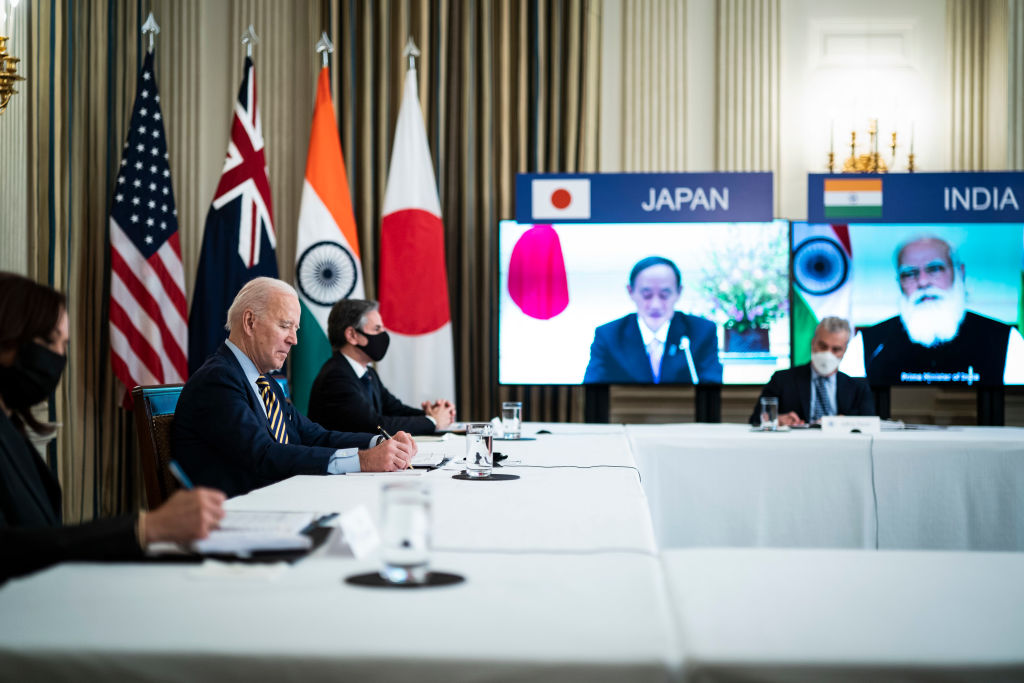
President Joe Biden, joined virtually by Australian Prime Minister Scott Morrison and British Prime Minister Boris Johnson, speaks about a national security initiative from the East Room of the White House in Washington, D.C., September 15, 2021. /CFP
President Joe Biden, joined virtually by Australian Prime Minister Scott Morrison and British Prime Minister Boris Johnson, speaks about a national security initiative from the East Room of the White House in Washington, D.C., September 15, 2021. /CFP
Editor's note: Andrew Korybko is a Moscow-based American political analyst. The article reflects the author's views and not necessarily those of CGTN.
The leaders of Australia, the UK, and the U.S. announced a new trilateral military alliance on September 15 – called AUKUS – which will facilitate the sharing of technological information between them. This will include cooperation on artificial intelligence (AI), cyber issues, long-range strike capabilities, quantum computing, and underwater systems. Although not openly stated, their leaders made it obvious that it's meant to "contain" China in the Asia-Pacific as part of their latest act of unprovoked aggression against it in the new Cold War.
As the saying goes, "the best-laid plans of mice and men often go awry," and AUKUS is already backfiring on America. Far from acting as a catalyst for uniting its allies against China, this alliance is actually exacerbating differences among them. The clearest evidence of this is French Foreign Minister Jean-Yves Le Drian's condemnation of the initiative's flagship project to have the UK and the U.S. help Australia obtain a fleet of nuclear-powered submarines.
The continent-sized country will abandon its prior AUS$90 billion ($66 billion) deal with Paris on these vessels that were plagued with problems over the past few years. The minister said that "This is really a stab in the back. We have established a relationship of trust with Australia. This trust has been undermined. And today I am angry over the termination of this contract." His sharp remarks came despite U.S. President Joe Biden praising France's role in what his country and its allies have recently taken to calling the "Indo-Pacific."
According to the American leader, "France, in particular, already has a substantial Indo-Pacific presence and is a key partner and ally in strengthening the security and prosperity of the region. The United States looks forward to working closely with France and other key countries as we go forward." While it's true that France is a player in this region due to the lasting legacy of its colonial-era possessions there, Washington's smooth words weren't enough to placate Paris after it just lost out on what its media referred to as the "Contract of the Century."

U.S. President Joe Biden meets virtually with the Quad in the State Dining Room at the White House in Washington, D.C., March 12, 2021. /Getty
U.S. President Joe Biden meets virtually with the Quad in the State Dining Room at the White House in Washington, D.C., March 12, 2021. /Getty
Biden truly backstabbed his country's French allies in a sneaky profit-driven manner that they would have expected from his predecessor former U.S. President Donald Trump, not his Democratic replacement who promised to restore his partners' trust in the U.S. This false sense of strategic security was embodied by the slogan "America's Back" that Biden repeated during his European tour earlier this summer. Nevertheless, it all appears to have been nothing more than a crude deception in hindsight.
The newfound rift between the U.S. and France over America's poaching of its NATO ally's multi-billion-dollar military acquisition deal with Australia threatens to widen transatlantic divisions. It might prompt Paris to resist Washington's pressure upon the EU to further worsen ties with Beijing out of so-called "democratic solidarity" like Biden has been obsessed with doing since taking office. On the topic of "democracy" rhetoric, AUKUS must have also been a shock for Australia and the U.S.' fellow Indian and Japanese Quad allies.
Those two Asian members of this emerging anti-Chinese military bloc truly thought that they were equals with everyone else but now it's clear that its American leader sees Australia as more important than them. India and Japan have been hoping to clinch similarly privileged military and technological cooperation deals with their shared American ally. India has already signed several so-called "foundational agreements" with America to this end, while Japan is its decades-long mutual defense partner, yet neither have received such perks.
The optics of this Anglo-American pair dominating the Quad are racially uncomfortable since they suggest that these majority-Caucasian countries see themselves as superior to their Asian counterparts. The establishment of an ethnic hierarchy within this supposedly "pro-democratic" anti-Chinese bloc wherein the Anglo-American duo strategically stand head and shoulders over their Asian junior partners completely discredits the ideological basis for the Quad and exposes it as nothing more than a neo-imperialist geopolitical project.
The outcome of this observation is that AUKUS not only worsened transatlantic ties between the U.S. and France within NATO, but also transpacific ties between the U.S. on the one hand and India and Japan on the other within the Quad. Biden's talk about assembling a so-called "alliance of democracies" to "contain" alleged "autocracies" like China rings hollow since it's clear that military-industrial profits and ethno-supremacy take precedence over superficial solidarity on the basis of ideology. By backstabbing France and signaling Asia's junior status vis-a-vis the Anglosphere-led campaign to "contain" China, AUKUS has already backfired on America.
(If you want to contribute and have specific expertise, please contact us at opinions@cgtn.com.)

